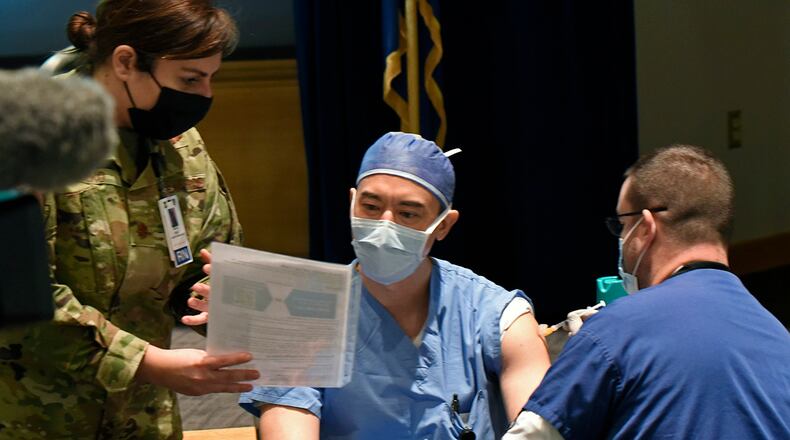“We have been getting calls from Airmen at Wright-Patterson,” attorney Greg Rinckey, of the New York law firm Tully Rinckey, told the Dayton Daily News Friday.
Some service members “are scared and skeptical, basically, to take the vaccine when it’s an experimental vaccine,” he said. “That’s really what we’re seeing.”
He said his firm is getting “multiple calls” from service members interested in litigation or class-action lawsuits.
Rinckey, a former Army attorney who served with the Judge Advocate General’s ( JAG) Corps, declined to make Wright-Patterson service members available for interviews before a suit is filed.
Advocates of the COVID vaccine say few vaccines have been more widely distributed or scrutinized. About 58.2% of the US population has received at least one Covid-19 vaccine dose, according to federal data, and about 49.9% is fully vaccinated.
“If you’re not vaccinated, please remain educated and up-to-date on various vaccine options,” Col. Christian Lyons, commander of the 88th Medical Group at Wright-Patterson, said in a Facebook town hall on Aug. 4. “Vaccines have proven to work. Over 99% of deaths and 97% of hospitalizations are among the unvaccinated population.”
Of the base’s last 122 COVID positive cases, 25 of those were fully vaccinated, Lyons also said. About 20% of the base’s COVID-positive cases, in that instance, had been vaccinated.
But medical experts say the vaccine lessens the severity of symptoms and reduces hospitalizations and deaths resulting from COVID infections.
Rinckey said some service members have qualms nonetheless, especially since the FDA has approved the COVID vaccines only on an “emergency-use basis.”
“Up until the point the vaccine is … FDA-approved, military members can’t be mandated to take the vaccine, unless the president of the United States would waive that requirement,” he said. “It’s very similar to what we kind of saw with the anthrax vaccine back in the ‘90s.”
In 2003, a federal judge sided with service members who sued, maintaining that the military could not administer a vaccine that has not been fully licensed without their consent. That program was stopped, the Associated Press reported recently.
During the first eight years that the Pentagon required anthrax vaccines, hundreds of troops refused the vaccine due to health or religious reasons, the Military Times reported this year. Some members received nonjudicial punishment, lost rank and pay, while others saw their careers ended or “even faced brig time and dishonorable discharges,” the publication said.
“It was my understanding that once it was FDA-approved, then it could be ordered,” Rinckey said, referring to the anthrax vaccine.
Members of the active-duty military are routinely given vaccines, and unvaccinated service members can sometimes face restrictions or not be permitted to deploy abroad.
“From Day 1 we are all about readiness,” Rear Adm. Bruce L. Gillingham, the surgeon general of the Navy, told the New York Times recently. “My advice is that when it is licensed, we should mandate it.”
Of active-duty Air Force members, 61 percent have been fully vaccinated, the head of the Defense Health Agency told reporters this week.
If the vaccine is mandated for all service members, not just deployable service members, Rinckey predicts “an interesting case.”
“I tend to think, if it comes down to a court, I think a court would probably say that it could be mandated by the military, because the military is in close proximity,” he said. “You’re on a ship; you’re in a barracks.”
He added: “There are good arguments on the other side. It’s not FDA-approved.”
About the Author

